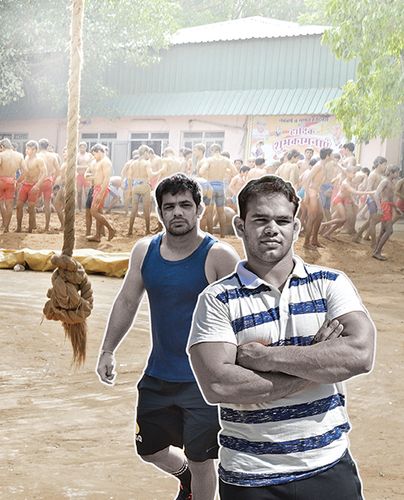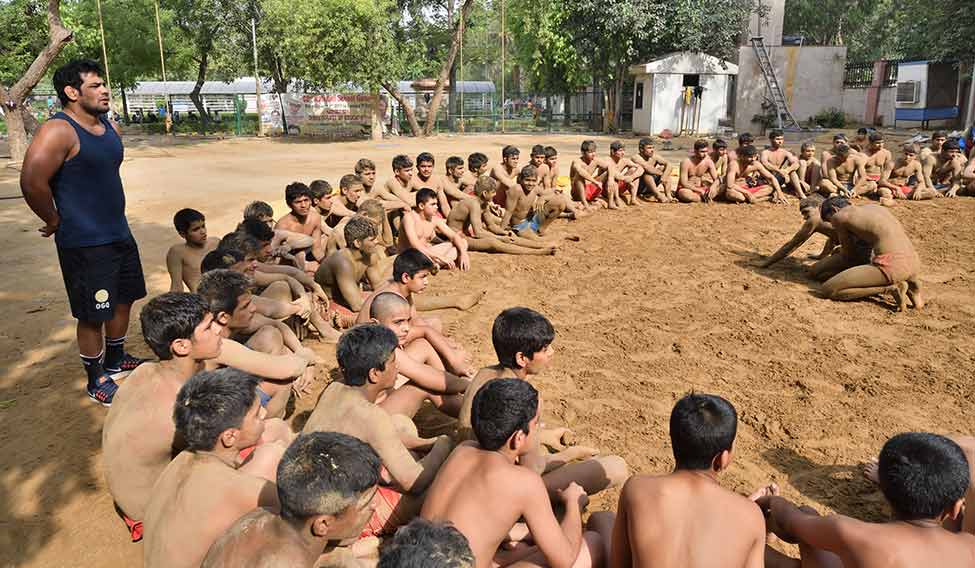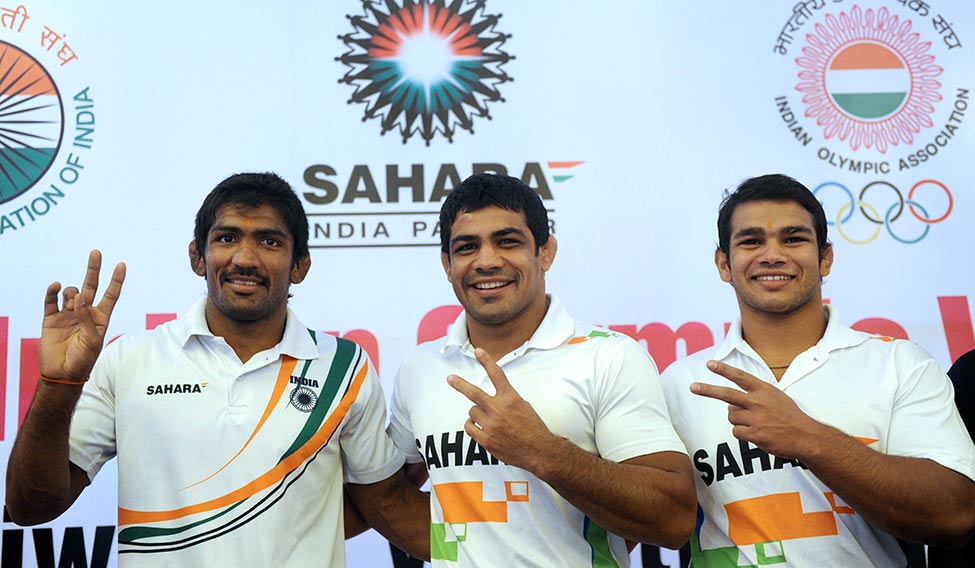Sports Authority of India’s training centre in Kandivali, Mumbai, is getting a major facelift. Even in this harsh afternoon, work is on full swing at the site of the athletes’ hostel. On a slope, parts of the old quarters are still standing—shabby, barrack-style. Nearby, a white SUV with a red beacon stands. It is Narsingh Yadav’s car; the wrestler is a deputy superintendent with the Maharashtra Police.
His room is on the ground floor of one of the new blocks. The door is open, to get some respite from the heat. It is siesta time. Yadav and another athlete are fast asleep. We tap on the door, waking them up. The duo come to their feet, ask for a minute to straighten the room, throw a purple bedspread over the mattress and invite us in.
Kandivali does not figure among the best SAI centres. It is definitely not as well-equipped and comfortable as the Sonepat centre, the hub of wrestling. But, this is where Yadav grew up. It is his second home. And, that is why he is here, almost a year after his dreams of an Olympic medal were shattered. In Kandivali, Yadav is putting his life back together. Piece by piece.
He is calm and welcoming, but his face has a faraway look when he sits down to chat. All seemed going well for him before Rio 2016. He picked up a bronze in the 2015 World Championship; he got the police job, too, for it. Then, just before Rio 2016, he tested positive for a banned substance.
The National Anti Doping Agency (NADA) gave him a clean chit. But, the World Anti Doping Agency (WADA) filed an urgent appeal with the Court of Arbitration in Sports. The CAS’s ad hoc division, set up to fast track cases involving Rio-bound athletes, handled the case. NADA had acquitted him accepting his plea that he was a victim of sabotage. An underage cadet was accused of spiking his food. The CAS did not buy this argument.
And, so, barely 12 hours before his scheduled bout at Rio’s Carioca Arena 2, Yadav was handed a four-year ban. The ban came after he had weighed in. He spent the night in an apartment in the players’ village, under the watchful eyes of his coach Jagmal Singh and Ram Yadav, sports officer of JSW Sports, his sponsor. They were worried that he might attempt suicide. Unless he is proven innocent, Yadav will miss Tokyo 2020. And, so, Yadav is focussing on Plan B.
“NADA is not a small organisation,” he said. “I got a clean chit after following all procedures. My case was deliberately highlighted so much that WADA took it up as priority. Other athletes were allowed to compete until the final judgement was pronounced. I pleaded with them to let me compete. But, to no avail. I have done nothing wrong.

“Whatever happened with me was wrong. It should not happen to any athlete. I am still fully confident that the CBI enquiry will give me a clean chit. Post Rio, I have continued training in the morning and evening. I am preparing for the Commonwealth Games and Asian Games next year. I am hopeful of participating in Tokyo, too. I hope the CBI inquiry report comes out soon.”
Haryana Police had initially investigated the case as the alleged sabotage had taken place in the Sonepat centre. The police made initial enquiries, interrogated the cadet and filed an FIR against unknown persons. On October 18, 2016, the police transferred the case to the CBI.
Wrestling Federation of India has thrown its weight behind Yadav. WFI president Brij Bhushan Sharan Singh, BJP MP from Gaunda, Uttar Pradesh, was furious and was instrumental in getting the CBI involved. “The whole affair—the way he got caught for doping at the last stage before Rio—would an experienced, international, medal-winning athlete do this?” Singh fumed. “There are so many loopholes in the whole thing. The complaint against Narsingh to WADA went in English. Who was this complainant? We would like to know.” Singh blames NADA and SAI. “I wanted the CBI enquiry to ensure the same does not happen to any athlete ever again. Our role ended the day the CBI enquiry started.”
The selection drama preceding Rio 2016 has torn Indian wrestling apart. The WFI’s new selection policy and trials resulted in a legal battle where wrestler Sushil Kumar questioned Yadav’s selection in the Delhi High Court. Yadav and Jagmal Singh were even provided with security at Sonepat, as there were fears of his life being in danger. Injeti Srinivas, director general, SAI, had even offered Yadav the option of training in Kandivali. But, Yadav stay put with the Indian team in Sonepat. “I have very strong will power,’ Yadav said. “I don’t accept defeat easily. When the incident happened, there was a lot of tension. But, I was training daily.”
Sources said the CBI has examined around 20 witnesses, including Yadav and the cadet. “Documents from various agencies are being collected and analysed,” said the source. The crime scene was recreated by the CBI and Central Forensic Science Laboratory teams. A sample of the spiked food is with the CFSL for testing. The results are awaited. “Issues pertaining to bio-medical intricacies have been referred to a medical board,” the source said.
According to those in the know, the CBI probe’s primary brief is to establish if the sabotage happened at all. The politics does not interest the investigators. Singh said, “It is not an intricate or complicated case, per se. Of course, it is not like the regular cases that the CBI gets to investigate. The CBI is meticulously collecting evidence to come to a proper conclusion.”
Yadav said he was in the dark about the progress of the investigation. But, he had recently lashed out against wrestler Sushil Kumar, whom he largely blames for the chain of events. He is on tricky ground, as he has no evidence to back up his allegations against the double Olympic-medallist and his camp. The pre-Rio fiasco not only laid bare the bitter relationship between Yadav and Kumar, but also exposed the caste-based and regional divide in Indian wrestling.
 Passing the baton: Sushil Kumar guiding cadets at Chatrasaal Stadium, New Delhi | Sanjay Ahlawat
Passing the baton: Sushil Kumar guiding cadets at Chatrasaal Stadium, New Delhi | Sanjay Ahlawat
Recently, Yadav wrote to the ministry of youth affairs and sports questioning Kumar’s appointment as government observer for wrestling. He said there was a conflict of interest, as Kumar trains budding wrestlers at the Chatrasaal Akhada in New Delhi. The ministry rejected Yadav’s allegations, but Kumar quit anyway.
For Yadav, the pain is unforgettable. “Coming back to the mat was not easy after Rio,” said Yadav. “I had one life ambition—an Olympic medal. I had won all other competitions, including the World Championships. I had just one dream left. I had beaten almost all my opponents in the 74kg category, barring one. And I was confident I would win the medal in Rio. It’s a set back for me and the country. Had I won a medal, it would have added to the nation’s tally.
“The government should ensure this does not happen to another athlete. Now I am running around, pleading with CBI officials to hear my case and trying to move the investigation forward. Athletes should not be doing that. But, such is life. Good and bad things keep happening. I look at it as a bad dream, and I need to move on.”
Meanwhile, as he counts the days, weeks and months to exoneration, has he met or spoken to Kumar?
“No, never. What’s the need to talk?”
From being a simple wrestler to winning two Olympic medals to heading Delhi Government’s sports department and, now, returning to competitive wrestling, Sushil Kumar’s life has come a full circle.
There are multiple sides now to Sushil Kumar 2.0—the teacher, the entrepreneur, administrator and, until recently, government observor. When THE WEEK met Kumar at about 8am at the Chatrasaal Stadium he was just back from the pooja of his new store, a Patanjali franchise in west Delhi.
As teacher, he carries forward the tradition of Satpal Singh, his guru and father-in-law. Initially, Kumar was trained by coaches Yashvir Singh and Rampal Mann. Then, Satpal took over and honed him into Olympic material.
As cadet, Kumar had trained in the mud pit, aka akhada, at the Chhatrasal Stadium in north Delhi. He teaches here now. Beyond the pit is a spanking new training hall decorated with posters celebrating Kumar. Little wonder that the cadets are all ears when he explains the intricacies of a move. Seated in the mud, the boys absorb every word, every move of his.
After his intense training session with the cadets, Kumar takes a breather and starts his own training regimen. The aim he says is to be fit and ready for whatever the guru throws at him.
“I start my day training in Chhatrasal Stadium,” he said. “We have around 250 kids here. We train with them, teach them. Guruji, too, comes here in the morning to teach the kids. My whole day is about sports.” His children, twins, will soon join him for training. Akhada time is family time, too!
Kumar returned to competition during the national championships held in November, and won the gold in the 74kg category. The medal came with its share of controversies; three opponents gave him a walk over—quarterfinal, semi-final and final.
His ‘return’ to competition means his days as administrator are numbered. Kumar the bureaucrat is said to be as dogged as Kumar the wrestler. He is currently officer on special duty in the Delhi government’s sports department. Just before THE WEEK visited him, he had paid a surprise visit to the Bharat Nagar Academy run by Sanjay Bharadwaj, famous as Gautam Gambhir’s coach. Kumar has been conducting such visits on sports facilities under the Delhi government. He was unhappy with the upkeep of Bharat Nagar Academy, which stands on government land in north Delhi.
When Bharadwaj met Kumar in his office, the contrast was stark. Gone was the humble wrestler who had wowed the nation when he folded his hands in a namaste after the winning bout in Beijing 2008. In his place was a strict officer speaking his mind. “Responsibility increases when you take [up a post],” he said. “You have to monitor things—through files, or physically.” But, does the wrestler in him enjoy the files? “Bilkul (Absolutely),” he said. “Files are only part of the work I do to promote sports. You have to go out. You cannot promote sports by sitting in an office.” As government observor, his job entailed sending reports related to national camps and selection of teams to the ministry. He quit after questions about conflict of interest were raised.
Kumar says age is not a hindrance while competing at highest level. says he is fighting fit. “[With age,] you tend to work less [on technique] and depend more on experience. As a wrestler gains experience, he understands how much work is needed. The core is to maintain yourself. If you continue training, it is not difficult.”
“I feel sportsmen with [international] experience can contribute meaningfully,” Kumar said. “It is time they were given bigger responsibilities. The camps need to be maintained well, there should be discipline among coaches and athletes, the right diet, right training... everything is important. There are gaps between athletes, federations and the government. Observors were brought in to fill it.”
 Things fall apart: (From left) Yogeshwar Dutt, Sushil and Narsingh during the official send-off for the London 2012 team | AFP
Things fall apart: (From left) Yogeshwar Dutt, Sushil and Narsingh during the official send-off for the London 2012 team | AFP
Those who have watched Kumar grow say the man has changed. He is always accompanied by guards now. Musclemen, perhaps former wrestlers. They are armed, discreetly, but suitably. Media reports said local goons were misusing Kumar’s name in property disputes in the past. Then there is the glitz. Why not? He is India’s lone individual double Olympic medallist.
“Arrey, that is not true at all,” he said about the guards and the goons. “See, you caught hold of me easily. I have not forgotten anything. True, I have gotten busier now.”
All said, many blame him for the current situation in Indian wrestling. His supporters say no one could have seen the chain of events that far. His decision to opt out of the 2015 World Championships in Las Vegas was a watershed moment. Its fallout left Indian wrestling divided on regional and caste lines. In the immediate aftermath, it cost him a ticket to Rio 2016.
Then came his ditching the Pro Wrestling League (PWL) launched by the WFI and backed by promoters. Kumar had said that he pulled out because the PWL’s commercial partner had ill-treated him. The gossip mills said that he was peeved over being offered a lower fee than Yogeshwar Dutt, his contemporary and a London bronze medallist. The wrestling fraternity placed all blame on Satpal’s doorstep. Perhaps because they all loved and still love the simple boy from Baprola.
Within days of Kumar pulling out of PWL, the WFI announced that there would be no selection trials for the 74kg category, ahead of Rio 2016. Kumar unsuccessfully moved High Court against this. It did not help that Kumar had skipped all major competitions before the Olympics. Meanwhile, Narsingh Yadav, who had won the quota through his performance, found that his place was under pressure and his life allegedly under threat. In the end, Dopegate felled Yadav. And, he said it was sabotage by Kumar’s camp.
The current selection policy is of concern to Kumar. The WFI has announced its selection policy for Commonwealth Games and Asian Games 2018. Kumar said, “If an established system is working right, then it should not be tinkered with. When its not working right, it should be changed. In my view, the selection policy should be changed.”
The whole Rio 2016 fracas has left its mark on Kumar, too. “See, it remains with you,” he said. “I had prepared really well for the Olympics. WFI asked me to prepare. Otherwise, I would not have trained. I have a very bad habit of trusting people easily. But, I learnt many lessons from that episode.”
When asked to elaborate on the last sentence, he said, “Now I don’t trust people easily. I believed in the WFI. They asked me to go to court. I went and challenged the selection. I did not need to do it. I had already won two Olympic medals.”
Kumar said he had no grudge against Yadav. “He is like my younger brother,” said Kumar. “Even today I say that. He is a very good boy. I supported him after that incident, too. People asked me to challenge the Delhi High Court order. I refused. Team get disturbed this way. I am not very ambitious. I had let go of the Asian Games. God has been so kind to me.”
But, Kumar insisted that he will not forget that time. “Sometimes, when I sit alone, I do think of that entire episode. How people tried to take advantage of me, tried to make a fool of me....”







